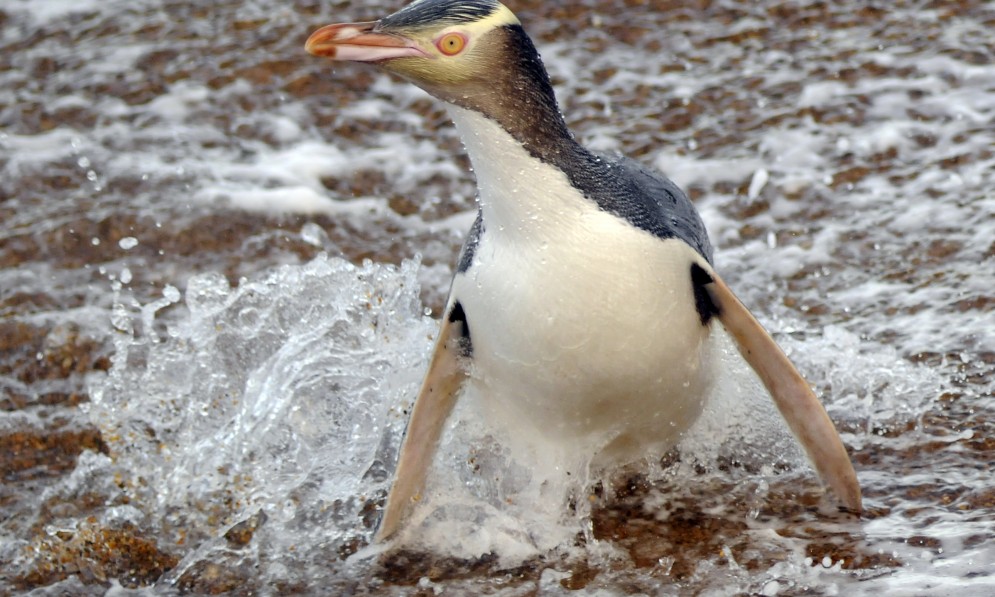Forest & Bird is calling for closures of selected set net fisheries, in response to new international research that highlights the risk they pose to endangered hoiho/yellow-eyed penguins.
The first global review of penguin bycatch, published in the scientific journal Endangered Species Research, identifies the yellow-eyed penguin as one of three penguin species of significant concern.
The review identifies set nets (known in other countries as gillnets) as the fishing gear causing most penguin deaths.
Set nets - walls of fine nylon mesh used to catch fish by the gills – are used by around 330 commercial boats in New Zealand waters, and they’re also used by recreational fishers.
“Diving birds like penguins are unable to see the fine mesh underwater, and become entangled and drown,” says Forest & Bird’s seabird advocate Karen Baird, who contributed to the review.
Yellow-eyed penguin numbers have dramatically declined in recent years, with only 246 breeding pairs found in a recent survey of the South Island coast. One population on Whenua Hou (Codfish Island) has declined by nearly 50% in the last year.
Yellow-eyed penguins face a number of threats, including fishing nets, climate change, disease and habitat degradation.
“The deaths of penguins in set nets is one threat that could be easily avoided,” says Ms Baird.
“In the past 20 years, yellow-eyed penguins have declined by 76% at previous population strongholds. We have reached the point where every bird counts,” says Dr Ursula Ellenberg, the New Zealand penguin scientist who initiated the global review.
Researchers link the low numbers of reported yellow-eyed penguin deaths to the low observer coverage (less than 3% of boats). Based on the limited observer data, one recent study estimates that set nets kill an average of 35 yellow-eyed penguins per year.
“Given the yellow-eyed penguin’s precarious situation, this level of bycatch warrants urgent attention,” says Ms Baird. “Preventing their deaths in set net fisheries is a major priority in saving this species from extinction.”
“The Ministry for Primary Industries have previously assessed the risk from fisheries bycatch to mainland yellow-eyed penguin as high.”
“Yet so far they have failed to act to protect penguins from commercial fishing,” says Ms Baird.
The global review recommends a number of actions to tackle the problem, including the presence of fisheries observers or video monitoring on vessels to monitor bycatch, and managing set net fisheries in important penguin foraging areas to reduce bycatch deaths.
“We want set netting boats in yellow-eyed penguin habitat to have observers or cameras on board, so we can better understand what’s going on.”
“But the situation is so urgent that we also need to immediately establish set net closures in key yellow-eyed penguin foraging areas,” says Ms Baird.
“This would benefit other penguin species and marine mammals such as Hector’s dolphins.”
Forest & Bird is calling on the Government to urgently bring together Ngāi Tahu, MPI, the Department of Conservation, community organisations and penguin scientists.
“Unless we see urgent action, we will lose yellow-eyed penguins from the mainland altogether.”
The article Tangled and drowned: A global review of penguin bycatch in fisheries has just been published in the scientific journal Endangered Species Research and is available here from 10am 30 November CET (10pm NZ time).
Notes for journalists:
- The review shows the level of bycatch is of greatest concern for three species: Yellow-eyed penguins, and Humboldt and Magellanic Penguins, both found in South America.
- The review has been coordinated by BirdLife International, of which Forest & Bird is a partner.
The review represents the collaborative work of 29 co-authors from across the globe. New Zealand penguin scientist Dr Ursula Ellenberg initiated and contributed to the review, and Forest & Bird’s seabird advocate Karen Baird is also an important contributor.

